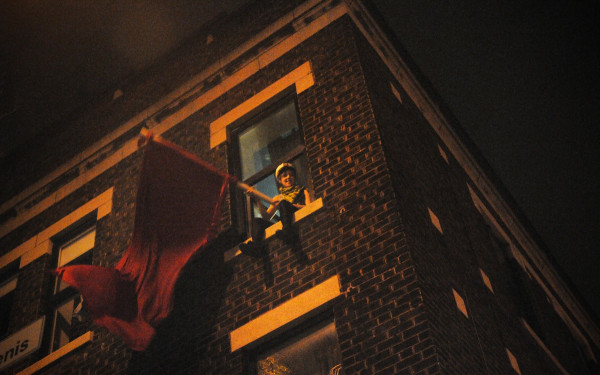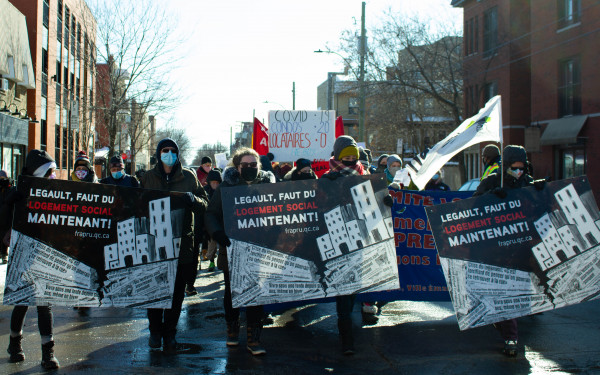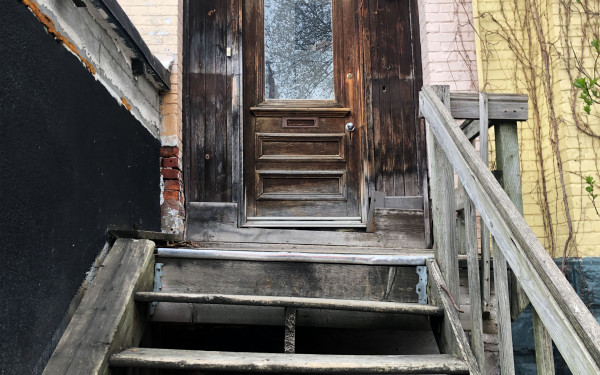Protesters Demand More Rights For Tenants
Groups Claim Government Office Favours Landlords
In front of the Régie du logement’s Montreal office, an effigy was destroyed by a crowd of about 80 people on Thursday.
While speeches were made, a protester dressed as an “eviction machine,” eating a tenant as they swang a boot while pretending to be the Régie. After speeches finished, they threw the costume around. Soon it was smashed and run over by a wheelchair.
The carcass was left at the Régie’s door.
The Regroupement comités logements et associations locataires du Québec is demanding that the state of housing in Montreal improve. Currently health problems and financial instability can’t be used as grounds of defense for those who fail to pay their rent, and the group wants to see that changed.
They demand that leases can only be terminated if landlords can prove a tenant has committed a serious offence, and that every case at the Régie be dealt with on a first come first serve basis. Right now, cases led by landlords get heard before those led by tenants.
Demands were read out by spokesperson of the group Marjolaine Deneault.
Led by RCLALQ, the crowd marched from Place Norman-Bethune to the Régie’s office and put up stickers and posters all over the front doors and windows of the office.
“[This event] is part of a campaign against the rental board’s two-tier justice system because we find that [it] really prioritizes landlords in the way they organize their cases,” said RCLALQ spokesperson Claire Abraham. “For example, every year the rental board sees over 45,000 eviction cases. It’s a huge social phenomenon that we’re not talking about.”
Protester and former president of the Comité d’action de Parc-Extension, Cecile Ngo Hull, said that she’s tried to get her problems resolved with the Régie three or four times but nothing ever came out of it.
Once, a landlord cut out her electricity because she had spoke out about problems in the building.
“I left on vacation and when I came back and everything was rotten in my fridge,” she said. “It took months for me to get the apartment to smell good again. At the Régie, the landlord brought in a witness that I had never met to say that there was a problem with the fuses. I had gotten the fuses checked out and there was nothing wrong.”
The Régie decided that because it was unclear why the power went out they would reimburse her for damages, but they never took any action against her landlord.
Lawyer Manuel Johnson often represents tenants at the Régie, and says that the rigid application of the law by the Régie creates stress for many Montrealers.
“Eviction is a very technical procedure,” he said. “If [tenants] owe more than $1 for more than three weeks, the eviction is automatic. The tenant has no defense. They can’t say ‘I got cancer, I was in the hospital, I missed my rent payment.’ Sorry, you’re three weeks late. ‘I lost my job, my welfare was cut off.’ The judge won’t even let them explain the human circumstances of their late payment.”
Johnson said the laws in place tend to give the upper hand to landlords. Rent non-payment cases can be heard within four to six weeks. On the other hand, tenants who want to take their landlord to the rental board because they have mold, bed bugs, or heating problems can wait up to two years before getting their case heard.
“It’s a system that favours the profit of landlords, and it puts the monetary questions over human needs,” he said. “It’s an inhuman system. We try to fight that inside the court, but there’s limited gains we can make.”
According to Abraham, 90 per cent of the cases that are heard at the rental board are submitted by landlords. That’s because many of the problems the rental board sees are about rental non-payments.
“It’s not a tribunal that allows equal access for all parties and that’s really problematic,” she said.
The average price for a one-bedroom apartment in Montreal is $700 per month, while welfare is $625. Half of tenant households live under the poverty line and there are over 100,000 households that spend half of their income into their rent, said Abraham.
“People just can’t afford to pay the rent,” said Abraham. “We don’t have enough social, affordable, and subsidised housing. The government really isn’t stepping up to its responsibility to make sure that people have the right to decent, affordable housing.”
Spokesperson for the Régie David Morin refused to comment.
Other groups protesting included Concordia’s Housing and Job Resource Centre, Logi Action, and the Comité d’action de Parc-Extension.
According to a HOJO assistant, Hannah Brais, a lot of the people who are affected by this are students and immigrants who are unsure of how to navigate the Régie and are left vulnerable.
“Landlords around here make apartments for students knowing they want to be close to school, don’t know their rights, and are unfamiliar with the actual cost of living in Montreal,” she said. “They will gouge tenants for apartments in really lousy conditions and charging them way too much.”

_900_600_90.jpg)
_900_600_90.jpg)
_900_675_90.jpg)





